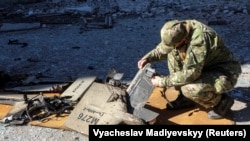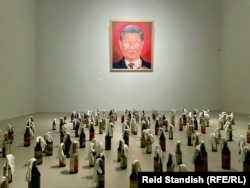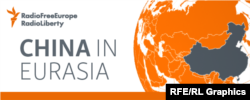
Welcome back to the China In Eurasia briefing, an RFE/RL newsletter tracking China's resurgent influence from Eastern Europe to Central Asia.
I'm RFE/RL correspondent Reid Standish and here's what I'm following right now.
How Chinese Parts Make It To The Battlefield In Ukraine
It's been a constant since Moscow's full-scale invasion of Ukraine in 2022, but Chinese parts and components -- as well as drones and some weapons -- are finding their way onto the battlefield and helping Russia's military.
Finding Perspective: The issue was pushed back into the spotlight following a video posted to Telegram by Chechen leader Ramzan Kadyrov showcasing an array of new military equipment, including eight Chinese-made unarmed armored personnel carriers.
The vehicles appeared to be a multipurpose model called the Tiger or China Tiger and the video brought renewed scrutiny of Chinese weaponry helping the Kremlin's war effort -- a possibility raised by Western governments and experts for some time.
It's difficult to determine when or how the Chinese vehicles ended up in Chechnya, or how they might be deployed on the battlefield -- if at all.
While the equipment is no doubt Chinese-made, multiple military experts I spoke with said it was unlikely this was from a formal sale, saying that the Tiger is widely exported around the world -- including across Africa and to Tajikistan -- and that Kadyrov states in the video that "we regularly purchase military equipment that helps our fighters be more effective in solving the tasks assigned to them."
Why It Matters: There is no evidence so far that China has provided any formal military aid, such as shipments of ammunition or full weapons systems.
Doing so would bring major reputational costs to Beijing and China has instead pivoted to taking up a diplomatic position around the war to frame itself as a peacemaker.
Still, Chinese exporters have supplied components of weapons systems and dual-use technology to sanctioned Russian defense companies.
A new report from The Wall Street Journal found that Iranian drones used by Russia in Ukraine had new Chinese parts that were made this year.
The revelation shows that new Chinese components are continuing to flow into Iran, where they then make their way to Russia. According to an investigation, the Chinese part was made in January, shipped to Iran, installed, and then sent to Russia and used against Ukraine in April.
While this stops short of full-blown military support, it highlights the complexities of supply chains and the multitude of ways countries can still skirt sanctions.
Another recent investigation by the Organized Crime and Corruption Reporting Project tracked an export path for Chinese drones from China to Russia to the battlefield via the Netherlands and Kazakhstan through a collection of Russian-owned companies.
Expert Corner: Slovakia, Elections, And Taiwan
Readers asked: "Along with the Czech Republic, Slovakia has been one of Taiwan's strongest supporters in Europe. The country is set to hold parliamentary elections in late September amid rising populism and growing pro-Russian, anti-Ukraine rhetoric on the political spectrum. How might that affect relations with Taipei?"
To find out more, I asked Matej Simalcik, the executive director of the Central European Institute of Asian Studies in Bratislava:
"There's still time until the elections and the polling is not yet conclusive about what the result may be or what kind of constellation of parties can form a coalition. But at the moment, the election could go either way and that could impact relations with China and Taiwan, even though neither are big election topics in Slovakia.
"In general, you can divide Slovak politicians into three groups when it comes to China. The first are those that are pragmatically pro-Chinese and see it as a source of economic benefits. The second are more ideologically inclined towards China. These two groups are mixed and matched across several political parties, but share elements of their worldview when it comes to economics and politics that tends to favor Chinese interests. The third group are those that are opponents of China ideologically while calling for some form of limited trade relations.
"Should the opposition form a government [likely led by former Prime Minister Robert Fico's Smer-SD party] then we'd see the first two groups have a larger voice. It's also important to observe that many of these politicians that tend to be pro-Chinese are also pro-Russian and they don't back China out of sheer goodwill. It's generally a very cold political calculus where they can use China in a way that fits into their anti-West narratives related to domestic politics or the war in Ukraine."
Do you have a question about China's growing footprint in Eurasia? Send it to me at StandishR@rferl.org or reply directly to this e-mail and I'll get it answered by leading experts and policymakers.
Three More Stories From Eurasia
1. Georgia's Chinese-Built Highway
A nearly $1 billion megaproject looks to transform Georgia's timeless landscape, but the Chinese-built highway is also grappling with questions over how the contracts were awarded and unexplained delays, as I reported recently from the country.
What You Need To Know: The Chinese-built project was the focus of a recent reporting trip to Georgia and I drove along the construction with my colleague Tamuna Chkareuli, who also took some excellent photographs.
The project is ambitious, with the 51.6-kilometer section cutting through Georgia's mountainous countryside and consisting of 96 bridges and 53 tunnels.
Once completed, the highway will transform travel in Georgia, which lacks high-quality infrastructure, and potentially cut the journey from the capital, Tbilisi, to the Black Sea coast in half while providing a much-needed boost to the country's tourism-dependent economy.
But the project is also dealing with criticism and scrutiny over how the winning contracts were awarded to a constellation of Chinese firms and a series of unexplained delays that has seen costs rise and construction deadlines extended. Read more about it here.
2. Badiucao's Show Goes On in Poland
I obtained an e-mail that shows the Chinese Embassy in Warsaw trying to pressure the Polish government to cancel an upcoming art exhibit in the Polish capital by dissident artist Badiucao. Read the article here.
The Details: In the written exchange sent on June 7 to senior officials at the Polish Ministry of Culture and National Heritage from embassy staff, a Chinese diplomat says that the art show is an attack against the image of "China and Chinese leaders" and that it hurts "Chinese people's feelings."
The e-mail then goes on to say that the show being hosted in Poland could harm the "bilateral relationship" between Beijing and Warsaw and asks for a meeting with senior ministry staff.
It's not the first time this has happened. Similar incidents occurred during past shows in Italy in 2021 and the Czech Republic in 2022. Badiucao is famous for his provocative political art that tackles topics like repressions in Hong Kong and Xinjiang, the Chinese Communist Party's response to the coronavirus pandemic, the 1989 Tiananmen Square crackdown, and broadly criticizing Chinese leader Xi Jinping.
Embassy officials have also visited the museum hosting the upcoming June 16 show and told them to shut it down.
3. Let's Get Virtual
This July's upcoming Shanghai Cooperation Organization (SCO) summit will now be held virtually, amid speculation that Russian President Vladimir Putin's fear of foreign travel is the main reason for changing the meeting format.
What It Means: India is offering no official reason for the switch, but many observers see the move tied to Putin being reluctant to leave Russia since he was indicted for war crimes by the International Criminal Court (ICC) and an arrest warrant was issued.
India is not a member of the ICC, but Putin's presence would likely lead to increased scrutiny of New Delhi's long-standing ties with Moscow and added pressure from the West.
Indian media have also reported that New Delhi's rocky ties with China and Pakistan, which are both members of the SCO, are also a factor. Neither Beijing nor Islamabad had reportedly confirmed top-level attendance for an in-person meeting.
A similar dilemma is also facing South Africa as it gears up to host the BRICS summit -- which is made up of Brazil, Russia, India, China, and South Africa -- in August.
Unlike India, South Africa is a signatory to the ICC and the government is already facing pressure over its ties to Russia and is also now considering switching to a virtual format for the summit, according to Semafor.
Across The Supercontinent
Fake Docs, No Deal: A Chinese construction company, the Gezhouba Group, was disqualified from participating in a major infrastructure project in Bosnia-Herzegovina after it submitted false documents and incorrect information in its bid to build a key tunnel in the country's south, my colleague Melisa Teletovic reported from Sarajevo.
The Limits Of Kabul And Beijing: Despite the appearance that China and the Taliban are becoming allies, the relationship is still limited and largely transactional, my colleague Abubakar Siddique reports.
'Sponsors Of War': Ukraine has officially designated Hikvision and Dahua "international sponsors of war," alleging that they supply Russia with products that have military purposes such as drones, thermal imagers, and anti-drone guns, along with contributing to Russia's budget.
As Charles Rollet from IPVM explains, the designation is "reputational only" and has "no legal consequences," but it still sends a powerful message from Kyiv.
No Ban: Brussels is working on a review of the so-called security toolbox for 5G wireless networks, and according to Politico, the EU isn't actually planning a full-on ban against Chinese telecoms giant Huawei, but "may use the opportunity to push governments that haven't applied the 5G security principles to high-risk vendors to fall in line and impose restrictions."
One Thing To Watch
Don't call it a "thaw" just yet, but U.S. Secretary of State Antony Blinken is expected to visit Beijing on June 18.
This was originally supposed to happen earlier this year before the appearance of an apparent Chinese spy balloon led to Blinken canceling his trip to Beijing. The upcoming visit comes after several months of rising tensions between the two countries and both sides will need to overcome a mutual mistrust that has been allowed to build following a number of recent incidents.
That's all from me for now. Don't forget to send me any questions, comments, or tips that you might have.
Until next time,
Reid Standish
If you enjoyed this briefing and don't want to miss the next edition, subscribe here. It will be sent to your inbox every other Wednesday.








